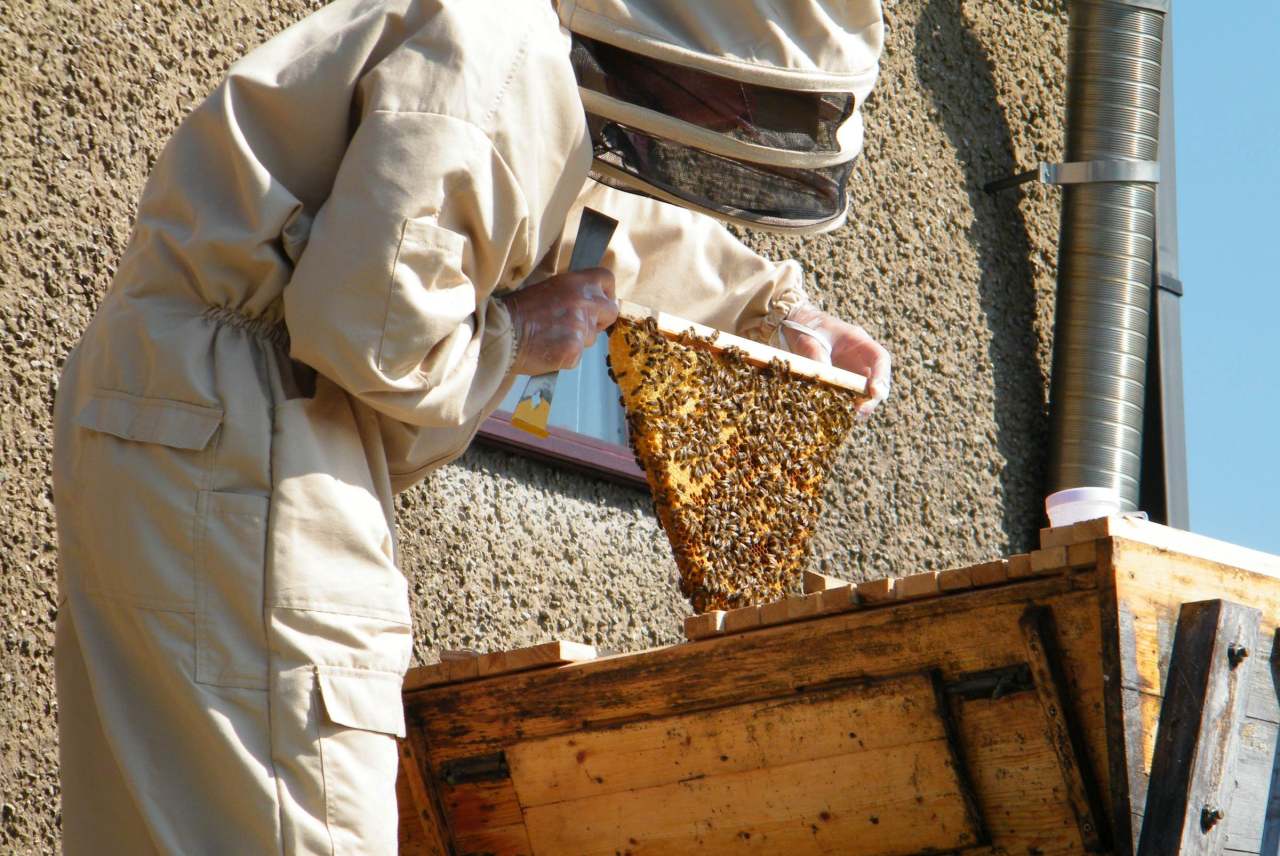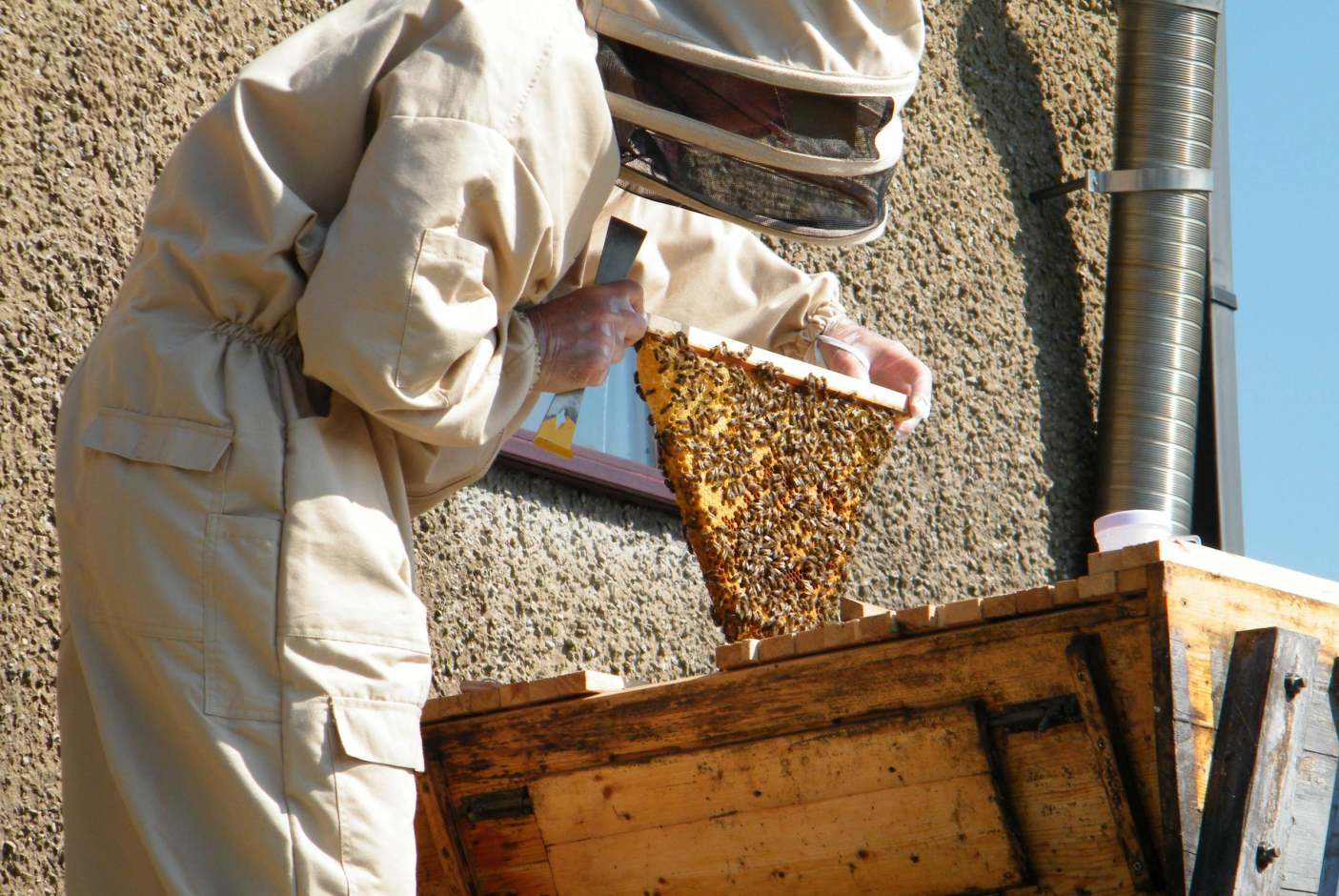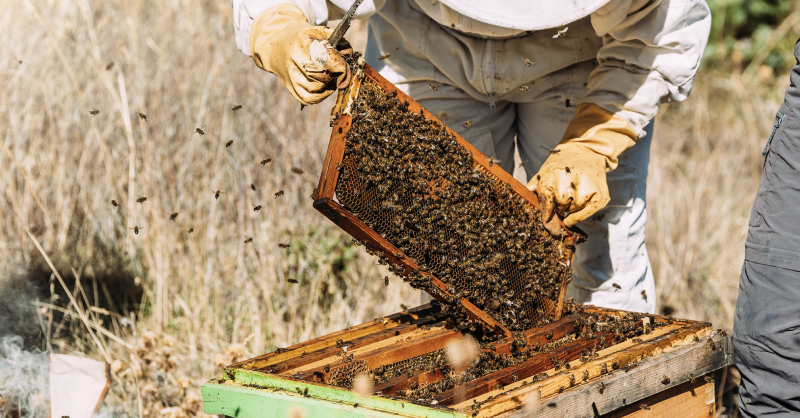Contents
I. Introduction to Beekeeping Ethics and Responsibility

Beekeeping is not just a hobby or a business; it is an ethical responsibility that requires dedication, care, and respect for the bees and the environment they inhabit. As beekeepers, we have a crucial role in ensuring the well-being of our buzzing friends while also promoting sustainable practices.
1. The Importance of Beekeeping Ethics
When it comes to beekeeping, ethics play a vital role in guiding our actions and decisions. It involves understanding and respecting the natural behavior of bees, as well as their intrinsic value as pollinators. By embracing ethical practices, we can contribute to the preservation of these invaluable creatures.
2. Promoting Sustainable Beekeeping
Sustainability should be at the core of every beekeeper’s approach. This means prioritizing organic methods that do not harm bees or contaminate their habitats with harmful chemicals or pesticides. By adopting sustainable practices such as integrated pest management (IPM), using natural remedies for diseases, and providing adequate nutrition through diverse pollen sources, we can create a healthy environment for our colonies.
3. Ensuring Hive Health and Welfare
The welfare of the hive should always be our top priority as responsible beekeepers. Regular inspections are essential to identify any signs of disease or stress within the colony promptly. Providing suitable shelter with proper ventilation helps maintain optimal hive conditions throughout different seasons.
4. Responsible Swarm Management
Swarms are a natural part of a honeybee colony’s life cycle but require careful management from beekeepers to prevent issues like overcrowding or aggression towards neighboring colonies. Responsible swarm management involves timely monitoring and capturing swarms when necessary while ensuring new homes are provided where they can thrive without causing harm.
5. Educating the Community
Beekeepers have a unique opportunity to educate their communities about the importance of bees and their role in pollination. By sharing knowledge about beekeeping, honey production, and the challenges bees face, we can raise awareness and inspire others to make environmentally conscious choices.
6. Collaboration with Other Beekeepers
Beekeeping is not a solitary endeavor; it benefits from collaboration and knowledge-sharing among beekeepers. Building networks with fellow enthusiasts allows for exchanging ideas, experiences, and best practices that contribute to the overall well-being of our colonies.
In conclusion, practicing ethical beekeeping requires a deep understanding of bees’ needs while promoting sustainability and responsible management techniques. By embracing these principles and educating others about them, we can foster healthier environments for bees while enjoying the sweet rewards of honey production.

When it comes to beekeeping, there are certain ethical considerations and responsibilities that every beekeeper should be aware of. These guidelines not only ensure the well-being of the bees but also contribute to sustainable practices and environmental stewardship. Let’s explore some key aspects of beekeeping ethics and responsibility.
The Importance of Bee Health
As a responsible beekeeper, it is crucial to prioritize the health and welfare of your bees. Regular hive inspections, disease prevention measures, and providing a suitable habitat are essential for maintaining strong colonies. Be proactive in monitoring their overall well-being to prevent potential issues.
Promoting Sustainable Beekeeping Practices
Sustainability is at the core of ethical beekeeping. Opt for organic methods whenever possible, such as using natural pest control solutions instead of harmful chemicals. Additionally, practicing swarm management techniques can help maintain healthy populations while minimizing stress on individual hives.
Educating Others about Bees
Beekeepers have an important role in educating others about these incredible pollinators. Raise awareness about their vital role in our ecosystem, advocate for protecting wild habitats where bees thrive, and encourage individuals to take actions that support honeybee conservation efforts.
Respecting Local Regulations
Before starting your own apiary or expanding an existing one, familiarize yourself with local regulations regarding beekeeping. Different regions may have specific requirements or restrictions on hive locations, colony numbers per property size, or even specific breeding practices. By complying with these rules, you contribute to harmonious coexistence within your community.
Maintaining Hive Hygiene
To minimize disease transmission among colonies and promote overall cleanliness within the hive, regularly clean and sanitize your beekeeping equipment. This includes hive components, tools, and protective gear. Proper hygiene practices help prevent the spread of pathogens and ensure a healthy environment for your bees.
II. Importance of Beekeeping Ethics

Beekeeping ethics play a crucial role in ensuring the well-being of bees, promoting sustainable practices, and maintaining the balance of our ecosystem. As beekeepers, it is our responsibility to adhere to ethical guidelines that prioritize the welfare of these incredible creatures.
The Welfare of Bees
One fundamental aspect of beekeeping ethics is prioritizing the welfare and health of bees. This involves providing them with appropriate shelter, ensuring access to adequate food sources, and implementing proper hive management techniques. By treating bees with respect and care, we contribute to their overall well-being and enable them to thrive.
Promoting Sustainability
Beekeeping ethics also emphasize the importance of sustainable practices within the industry. By adopting organic beekeeping methods and avoiding harmful chemicals or pesticides in hive management, we protect both bees and their environment from potential harm. Sustainable practices help preserve biodiversity by preventing contamination of nectar sources or water supplies while promoting long-term ecological balance.
Preserving Genetic Diversity
Beekeepers have a responsibility to preserve genetic diversity within bee populations. Maintaining diverse genetic traits enhances resilience against diseases and environmental changes that may threaten certain strains or species. Ethical beekeepers actively work towards preserving different types of honeybees through responsible breeding programs.
Educating Others
An essential part of practicing ethical beekeeping is spreading awareness about its significance among fellow enthusiasts as well as the general public. Sharing knowledge about sustainable techniques, emphasizing conservation efforts for pollinators like bees, and dispelling misconceptions can help create a community that values ethical practices in apiculture.
Supporting Local Ecosystems
Beekeeping ethics extend beyond caring for individual hives; they also involve contributing positively to local ecosystems. Responsible beekeepers ensure that their bees have access to diverse foraging opportunities by planting native flowers and avoiding monoculture landscapes. This supports the health of wild pollinators, enhances biodiversity, and strengthens the overall resilience of our natural habitats.

Beekeeping is not just a hobby or a business; it is a responsibility that beekeepers must uphold. These keepers of nature’s most vital pollinators have an ethical obligation to ensure the well-being and preservation of honeybees. In this article, we will explore the various aspects of beekeeping ethics and how they contribute to sustainable practices.
The Importance of Sustainable Beekeeping
Sustainable beekeeping focuses on maintaining healthy colonies while minimizing negative impacts on bees, other pollinators, and the environment. It involves adopting practices that support biodiversity, promote natural behaviors, and mitigate harm from factors such as pesticides.
One key aspect of sustainable beekeeping is providing bees with suitable habitats. This includes ensuring access to diverse forage sources throughout the year to support their nutritional needs. By planting flowering plants and creating wildflower meadows in apiary surroundings, beekeepers can help maintain healthy populations.
Promoting Bee Health
Beekeepers must prioritize the health of their colonies by implementing regular inspections and disease prevention measures. Regular hive checks allow them to identify signs of diseases or pests early on so that appropriate actions can be taken promptly.
Additionally, responsible beekeepers refrain from using harmful chemicals within their hives unless absolutely necessary for disease control. They opt for organic treatments whenever possible or explore alternative methods like integrated pest management (IPM), which minimizes chemical inputs while still protecting colony health.
Educating Others about Bees
An essential part of being an ethical beekeeper involves educating others about bees’ importance in our ecosystems. This includes sharing knowledge about pollination processes, honey production, and how individuals can create supportive environments for bees in their own backyards.
Beekeepers can engage with local communities by organizing workshops, giving presentations, or participating in outreach programs. By fostering a better understanding of bees and their role in our ecosystem, we can encourage more people to adopt bee-friendly practices and contribute to the overall well-being of these incredible insects.
Responsible Honey Production
When it comes to honey extraction, ethical beekeepers prioritize the welfare of their bees. They ensure not to overharvest honey or disturb the hive excessively during the process. This allows colonies to maintain healthy stores for themselves while also providing a surplus for human consumption.
Furthermore, responsible beekeepers focus on sustainable packaging methods that minimize waste and reduce environmental impact. Using eco-friendly materials helps preserve the balance between honey production and ecological sustainability.
The Role of Beekeepers in Conservation
Beyond maintaining their own hives, ethical beekeepers actively participate in conservation efforts aimed at protecting wild pollinator populations. They support initiatives that promote habitat restoration, reduce pesticide usage, and create safe havens for all pollinators.
By collaborating with local conservation organizations or joining regional networks dedicated to pollinator protection, beekeepers contribute significantly to long-term biodiversity preservation.
In conclusion,
Beekeeping ethics encompass various aspects that include sustainable practices, promoting bee health, educating others about bees’ importance,
responsible honey production and active participation in conservation efforts.
When adhering to these principles as responsible stewards of our precious pollinators,
beekeepers play a vital role in ensuring the survival and well-being of honeybees
while contributing positively towards environmental preservation.
Ethical beekeeping is not only necessary but also rewarding as it allows us
to nurture these remarkable creatures while safeguarding nature’s delicate balance.
III. Principles of Beekeeping Ethics
Beekeeping is not just a hobby or a way to produce honey; it is also a responsibility that comes with ethical considerations. As beekeepers, we must prioritize the well-being of our bees and ensure that our actions align with the principles of beekeeping ethics. Here are some key principles to guide us:
1. Respect for Bees’ Natural Behavior
One fundamental principle of beekeeping ethics is respecting and preserving the natural behavior of bees. Bees have intricate social structures and instincts that allow them to thrive in their colonies. It is crucial to provide them with an environment that promotes their natural behaviors, such as foraging, brood rearing, and swarming.
2. Sustainable Beekeeping Practices
Sustainability should be at the core of every beekeeper’s practices. This means implementing techniques and methods that do not harm or deplete bee populations or their habitats. Using organic pest control methods, avoiding pesticides harmful to bees, and promoting biodiversity in surrounding areas are all important steps towards sustainable beekeeping.
3. Health Monitoring and Disease Prevention
To ensure the well-being of our bees, regular health monitoring and disease prevention measures should be implemented. This includes conducting routine inspections for signs of diseases or pests, promptly addressing any issues identified, practicing good hive hygiene, and providing proper nutrition.
4. Responsible Use of Hive Products
Beekeepers have a responsibility to use hive products responsibly while ensuring the sustainability and welfare of their colonies remain intact. Harvesting honey should be done in moderation without compromising the bees’ food stores during critical times like winter months.
5.Environmental Stewardship
Beekeepers hold an important role as environmental stewards. It is crucial to create and maintain bee-friendly environments by planting pollinator-friendly flora, avoiding the use of harmful chemicals in nearby areas, and advocating for policies that protect bees and their habitats.
6. Continued Learning and Education
Beekeeping is an ever-evolving field, and it is essential to stay informed about the latest research, techniques, and best practices. Engaging in continued learning opportunities such as attending workshops or joining beekeeping associations can help us improve our skills as responsible beekeepers.
By adhering to these principles of beekeeping ethics, we can ensure the well-being of our bees while also promoting sustainable practices that contribute to the overall health of our environment. As responsible beekeepers, let us continue to prioritize the welfare of our beloved pollinators.
As beekeepers, we have a responsibility to care for our bees and the environment in which they thrive. It is important that we adhere to ethical practices and uphold certain standards in our beekeeping endeavors. In this article, we will explore some key aspects of beekeeping ethics and how they contribute to the sustainability of both bees and our planet.
Promoting Bee Health
One of the primary responsibilities as a beekeeper is ensuring the health and well-being of your bees. This involves regular inspections, disease prevention measures, and providing them with appropriate nutrition. By implementing integrated pest management strategies, such as using natural predators or organic treatments instead of harmful chemicals, you can protect your bees from pests while minimizing environmental impact.
Habitat Preservation
Beekeepers should also prioritize preserving natural habitats for wild pollinators. This means maintaining diverse floral resources throughout the year by planting native flowers that provide nectar and pollen. Additionally, creating nesting sites like wood piles or wildflower meadows can attract solitary bees and other beneficial insects to your area.
Responsible Honey Harvesting
When it comes to harvesting honey, ethical practices involve leaving enough honey reserves for the bees’ winter survival. Over-harvesting can result in weakened colonies that may struggle during colder months when food scarcity becomes an issue. It’s important to strike a balance between enjoying delicious honey while ensuring enough sustenance for your buzzing friends.
Educating Others
An essential aspect of being a responsible beekeeper is sharing knowledge with others about these incredible pollinators’ importance in our ecosystem. By educating friends, family members, and even local communities about the role of bees as pollinators and their declining populations due to various factors like habitat loss or pesticide use, we can inspire action and promote efforts to protect them.
Contributing to Research
Supporting research initiatives focused on bee health and conservation is another way to fulfill our ethical responsibilities. By participating in citizen science projects, such as monitoring hive health or reporting bee sightings, we can contribute valuable data that helps scientists understand bee populations’ trends and develop effective strategies for their protection.
IV. Responsible Beekeeping Practices
Beekeeping is not just a hobby; it is a responsibility that requires careful attention and adherence to ethical practices. As beekeepers, we have the power to contribute positively to the preservation of honeybee populations and support the overall health of our environment. Here are some key responsible beekeeping practices that every beekeeper should follow:
1. Providing Adequate Food Sources
Honeybees rely on nectar and pollen from flowers as their primary food sources. To ensure their well-being, it is essential to provide a diverse range of flowering plants throughout the year. This promotes healthy foraging habits and prevents honeybee malnutrition.
2. Using Organic Pest Control Methods
In order to combat pests and diseases that can harm honeybees, it’s crucial to use organic pest control methods rather than relying on harsh chemicals or pesticides. Integrated Pest Management (IPM) techniques such as screened bottom boards, regular hive inspections, and selective breeding can help maintain hive health without compromising environmental safety.
3. Maintaining Hive Hygiene
A clean hive is vital for promoting strong colony health. Regularly inspecting hives for signs of disease or infestation, removing debris, and replacing old comb helps prevent the spread of pathogens within the colony.
4. Promoting Natural Swarming Behavior
Natural swarming behavior is an important part of a healthy honeybee colony’s life cycle, allowing them to reproduce and propagate genetic diversity effectively. Encouraging natural swarming while providing suitable swarm capture options ensures proper population management without causing stress or harm.
5. Educating Others about Bees
Raising awareness about bees’ importance in our ecosystem is crucial for their protection. As responsible beekeepers, we should take every opportunity to educate others about honeybees, their role in pollination, and the environmental challenges they face. This can help foster a greater appreciation for bees and encourage more sustainable practices in our communities.
6. Supporting Research and Conservation Efforts
Contributing to scientific research and conservation initiatives provides valuable insights into honeybee health and ecosystem dynamics. By participating in citizen science projects or supporting local beekeeping associations’ efforts, we can actively contribute to the betterment of honeybee populations worldwide.
Beekeeping is not just a hobby or a way to produce honey; it comes with great responsibility. As beekeepers, we have an ethical duty to care for our bees and protect their well-being. This involves following certain guidelines and principles that ensure the health of the bees, promote sustainable practices, and respect nature’s balance.
The Importance of Ethical Beekeeping
Ethical beekeeping goes beyond simply managing hives; it encompasses a holistic approach towards the environment, biodiversity, and our role as stewards of these incredible creatures. By prioritizing ethics in beekeeping practices, we can contribute to the preservation of pollinators’ populations worldwide.
Promoting Sustainable Practices
Sustainability is at the core of responsible beekeeping. It involves using organic methods whenever possible, avoiding harmful pesticides that can harm both bees and their habitats. Sustainable practices also involve providing adequate nutrition for bees through diverse floral sources available throughout different seasons.
Caring for Bee Health
Keeping honeybees healthy should be every beekeeper’s top priority. Regular inspections of hives help identify potential issues such as diseases or pests early on so appropriate measures can be taken to prevent further spread or damage.
Supporting Biodiversity
Beekeepers play an important role in supporting biodiversity by maintaining diverse landscapes around their apiaries. Planting wildflowers and other flowering plants provides essential food sources for bees while contributing to overall ecosystem health.
Respecting Nature’s Balance
Beekeepers must respect nature’s delicate balance by ensuring they don’t overharvest honey or disturb natural processes within the hive unnecessarily. This involves leaving enough honey stores for the bees to sustain themselves throughout the colder months and avoiding excessive interference during critical stages of their life cycle.
In conclusion, beekeeping ethics and responsibility are crucial aspects that every beekeeper should prioritize. By adopting sustainable practices, promoting biodiversity, caring for bee health, and respecting nature’s balance, we can contribute to the well-being of our bees and protect these vital pollinators for future generations.
V. Environmental Impact of Beekeeping
Beekeeping, also known as apiculture, not only contributes to the production of honey and other bee-related products but also has a significant impact on our environment. The practice of beekeeping has both positive and negative effects on the ecosystem, making it crucial for beekeepers to prioritize sustainability and responsible practices.
Pollination Services
One of the most notable environmental benefits of beekeeping is its contribution to pollination services. Bees are essential pollinators for various flowering plants, including fruits, vegetables, nuts, and oilseeds. Through their constant movement from flower to flower in search of nectar and pollen, bees facilitate cross-pollination that leads to fruit production.
This natural process greatly enhances biodiversity by supporting plant reproduction and ensuring genetic diversity within plant populations. Without bees’ pollination services, many crops would suffer reduced yields or fail altogether.
Habitat Creation
Beekeepers play an important role in providing habitats for bees by maintaining beehives in suitable locations. By setting up hives near diverse sources of nectar and pollen-rich flowers, they create attractive environments for bees to thrive. This not only supports the survival of honeybee colonies but also contributes to a healthier ecosystem with enhanced floral diversity.
Furthermore, some beekeepers actively engage in habitat restoration efforts by planting native flowering plants that attract bees and other pollinators. These initiatives help restore degraded habitats while providing additional food sources for these vital insects.
Challenges: Pesticides and Varroa Mites
Despite its positive contributions, beekeeping faces several challenges that have adverse effects on both honeybees’ health and the environment at large:
- Pesticides: The use of pesticides in agriculture poses a significant threat to honeybees. Some pesticides, particularly neonicotinoids, have been linked to bee population decline and negative effects on their behavior and immune systems. It is crucial for beekeepers and farmers to adopt integrated pest management practices that minimize the use of harmful chemicals.
- Varroa Mites: These parasitic mites are a major threat to honeybee colonies worldwide. Infestations weaken bees, making them more susceptible to diseases and reducing their overall productivity. Beekeepers must take proactive measures such as regular monitoring, proper hive management, and treatment against varroa mites to maintain healthy colonies.
Sustainable Beekeeping Practices
To mitigate the negative environmental impacts associated with beekeeping, it is essential for beekeepers to adopt sustainable practices:
- Organic Beekeeping: By avoiding the use of synthetic chemicals within beehives and promoting natural methods of pest control, organic beekeeping minimizes environmental contamination while maintaining healthy colonies.
- Biodiversity Preservation: Encouraging diverse plantings around beehives helps provide an abundant supply of nectar throughout the year while supporting local flora and fauna.
- Educating Others: Raising awareness about the importance of bees in our ecosystem can inspire others to take action towards protecting these vital pollinators.

Andrew Boyer is an accomplished individual with a deep-rooted passion for bees and their conservation. Born and raised in a small town in Oregon, Andrew developed an early fascination with nature and the environment. He pursued his education at the prestigious University of Oregon, where he obtained a Bachelor’s degree in Environmental Science with a specialization in Entomology. During his time at university, Andrew conducted extensive research on the behavior and ecological impact of bees, earning him recognition from his peers and professors. His dedication to the field led him to internships at local beekeeping associations, where he honed his skills in hive management and honey production. Andrew’s expertise in beekeeping and his commitment to environmental sustainability make him a valuable asset in the conservation of these vital pollinators.
